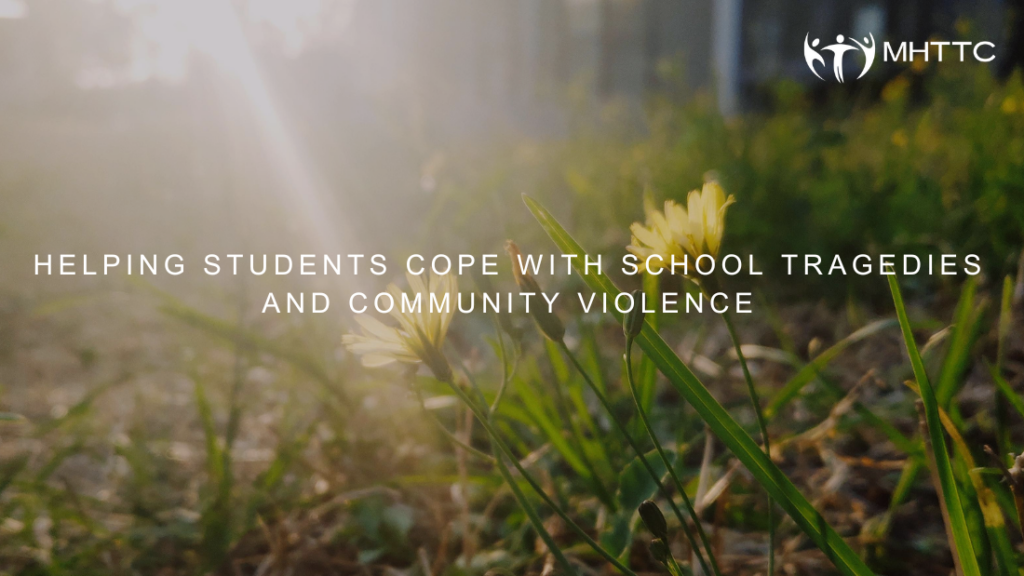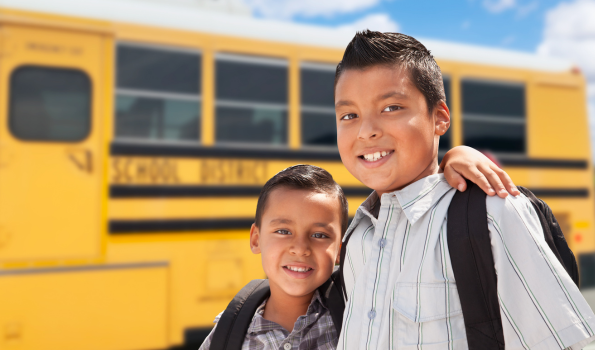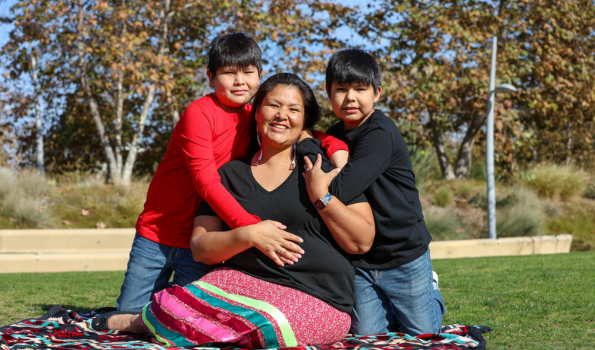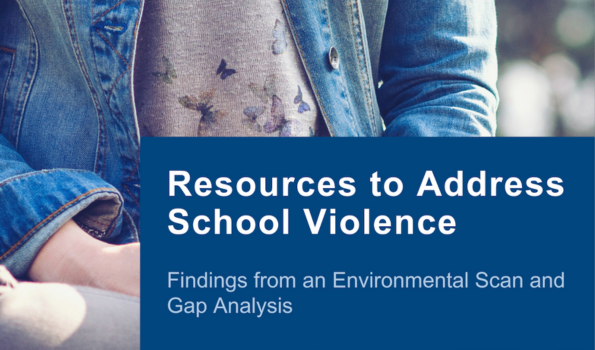Home > Resources to Address School Violence
The MHTTC Network was asked to amplify and disseminate existing programming and resources related to school violence for the school mental health workforce (e.g., crisis intervention teaming, school violence trauma and grief response, cultural considerations for school violence) and develop responsive training and technical assistance to address related needs. Through the MHTTC School Mental Health Initiative, the MHTTCs and MHTTC Network Coordinating Office led a national effort to respond to this request.
School violence is violence that occurs in the school setting. It describes violent acts that disrupt learning and have a negative effect on students, schools, and the broader community. School is the location where the violence occurs, not a type of violence. Examples of school violence include bullying and cyberbullying, fighting (e.g., punching, slapping, kicking), weapon use, gang violence, and sexual violence (CDC, 2021).
School violence also includes the following components: Structural violence, racial violence, and violence targeted at young people with minoritized identities (including gender, LGBTQ+ identity, refugee, asylum seeker, undocumented status or other immigration status, socioeconomic status, etc.); discriminatory acts; and the lack of understanding and absence of compassion towards diversity manifested in any shape or form to denigrate a person's dignity.
Below, we highlight several MHTTC-developed resources related to school violence and student mental health. Other resources and organizations of interest are also highlighted.

Resources for Coping with School Tragedies and Community Violence | MHTTC Network
Schools across the country have witnessed many difficult events in recent years, from a pivot to virtual learning during COVID-19 and protests for racial justice, to student suicides and gun violence. This resource page outlines resources on addressing crises that occur in schools and school communities, and how to move forward in the aftermath of these crises.

Addressing Bullying Among Hispanic and Latino Children and Youth at School Setting | National Hispanic & Latino MHTTC
This brief document informs about the prevalence of bullying among Hispanic and Latino students in the school setting. Although we have observed a decrease in bullying statistics, Hispanics and Latino students can be the target of these violent behaviors due to race or ethnicity. The document also covers effective prevention efforts to address bullying in the school setting.

Behavioral Threat Assessment in Schools: Evidence, Fit, and Appropriateness | MHTTC Network Coordinating Office
School violence, including school-based gun violence, is a major public health issue that has negative consequences for students, families, schools, and communities. One approach that schools have adopted to address school violence is behavioral threat assessment (BTA). Based on a request from our funder, the Substance Abuse and Mental Health Services Administration, we developed a report on behavioral threat assessment and its intersection with youth mental health.

Bullying Prevention Through Empathy Webinar | South Southwest MHTTC
While many teachers and administrators affirm the importance of building empathy, they often do not have a toolbox of plug-and-play activities they can use in their classrooms and schools. This session first explains the key research findings in this area before providing concrete ideas for project-based and experiential learning to decrease peer aggression offline and online, and promote intervening behaviors from bystanders.

Take HEART Community of Practice-Compassionate School Practices: Vision, Plan, and Monitor for Success | New England MHTTC
In this session, school staff gained an understanding of how a compassionate school mental health support system can help schools create systems, policies, and protocols to prevent, address, and recover from tragedies and crises including staff or student suicide, school violence, natural disasters, and global pandemics.

Trauma-Responsive Schools Webinar #1: Trauma-Informed Skills for Educators (TISE) Part 1 (of 2): Trauma 101 | Northwest MHTTC
The webinar is designed to enhance educators’ knowledge about trauma and its impact on students, as well as enhance educators’ ability to engage with youth who’ve been exposed to trauma. Experts provided information about the definition of trauma, the neurological impact of trauma on students, the signs and symptoms of trauma, and an explanation of how trauma can manifest in the classroom.

A Native Youth Round Table | National American Indian and Alaska Native MHTTC
In this webinar, Native Youth panelists explored a youth perspective on lateral violence, as well as how to heal and build a better Native community for all. We look forward to listening and learning from the Native youth to help guide us in our future work. Please join us in learning from our future leaders!

Bullying and Its Impact on Mental Health | Mountain Plains MHTTC
This webinar described the forms of bullying (physical, verbal, relational, and cyber) and the factors that contribute to it. Participants learned about the short- and long-term impact of bullying on the mental health of perpetrators, targets, and bystanders. The webinar also identified protective factors that can prevent bullying and buffer youths from its adverse impact.

Creating Trauma-Informed Policies: A Practice Guide for School & Mental Health Leadership | Pacific Southwest MHTTC
Creating compassionate policies is a cornerstone strategy of educational leadership. This guide provides a deep dive into developing, implementing, and evaluating trauma-informed and compassionate school policies. It highlights four "choice points" for education and mental health leadership: 1) Names & definitions; 2) Platforms & levers; 3) Approach; and 4) Match process to product.

Expect the Unexpected: Preparing for Crises in Schools | Mid-America MHTTC
Attendees learned the Five R’s for best practices in school crisis response: readiness, response, recovery, review/evaluate, and resources. Attendees identified common barriers to implementation of best practices and ways they can incorporate these vital components into their school’s crisis planning.

Resources to Address School Violence: Findings from an Environmental Scan and Gap Analysis | MHTTC Network
We conducted an environmental scan and gap analysis to 1) compile existing resources on school violence; 2) identify the gaps that exist in school violence-related resources available in the field; and 3) consider the development of new training, technical assistance activities, and/or resource(s) with a focus on addressing the gaps identified via the environmental scan and gap analysis. This summary highlights findings from that work, including free resources and resources lists, as well as organizations of interest that provide free resources, that were compiled through the environmental scan.

Conflict Resolution for School Communities | New England MHTTC
This webinar highlighted specific skills and strategies that help reduce conflict and respond intentionally to students, school staff, parents, and others in crisis. Our presenters reviewed a variety of processes relevant to conflict resolution in schools, including de-escalation tactics, active and reflective listening techniques, emotional coaching, and more.

Healing School Communities in the Context of Racial Violence: Where do we go from here? | MHTTC Network
This two-part learning series was intended for students, families, educators and school mental health professionals who are navigating the ongoing impact of racial violence in all forms on student mental health.

Recognizing and Responding to Trauma in the Wake of Mass Violence | South Southwest MHTTC
This resource is a list of evidence-based and best practice interventions utilized in the training and consultation opportunities the South Southwest MHTTC provides to address trauma needs of individuals impacted by incidents of mass violence. This list may be best understood as a sampling of interventions that are best employed simultaneously, as part of an overarching community response that can set communities on a path toward resilience.

The Community Resiliency Model (CRM) in Schools | Southeast MHTTC
The Community Resiliency Model (CRM)® is a skills-based wellness and prevention program that provides a biological, non-stigmatizing perspective on normal human reactions to stress and trauma. CRM is a valuable resource for individuals coping with chronic stressors such as physical pain, addiction, and grief and loss. A range of persons that suffer the effects of cumulative trauma (e.g., violence, poverty, racism, homophobia) benefit from these tools.

What Now? Supporting Students after a Mental Health Crisis | Mid-America MHTTC
Attendees learned about best practices in reintegration, including supporting students transitioning from a mental health-related crisis back into the school setting. Attendees gained knowledge on the role of educators in this transition, as well as strategies for implementing this in their school buildings.
Preparing Our Children for Emergencies | National Child Traumatic Stress Network
Response and Recovery After School Violence | National Child Traumatic Stress Network
School Counseling Anti-Racism Toolkit | American Counseling Association
School Safety Centers | National Crime Prevention Council
National Center for School Mental Health (NCSMH)